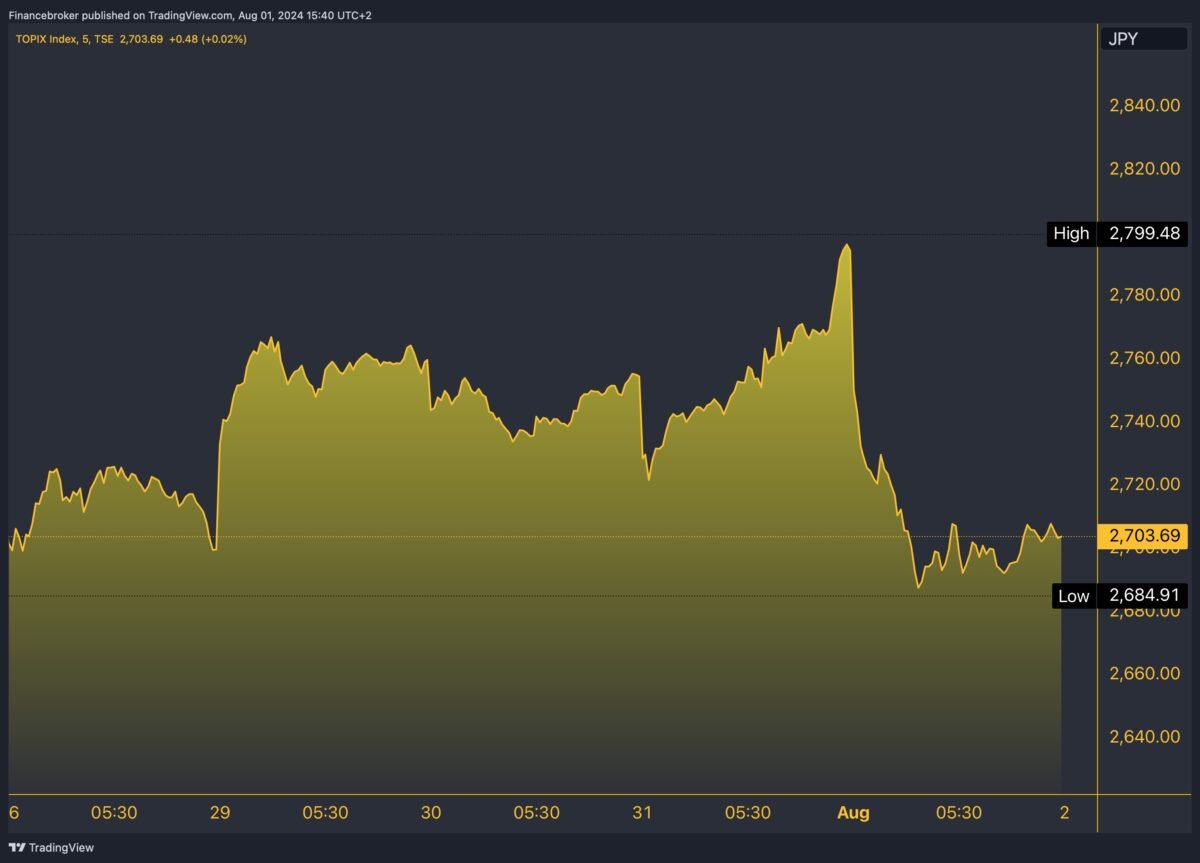
Japan Stocks Declined Today: Topix Shaved Off 3.2%
Table of Contents
Asian markets were mixed today; some assets soared, while others traded in the red. Japanese shares tumbled down, but the yen jumped on the forex exchanges. Furthermore, the Japan stock market saw the Topix index hit its lowest level since April 2020, experiencing a substantial selloff. At the same time, real estate stocks declined.
On Thursday, the Topix dropped by 3.2% because of the wide bearish trend that encompassed almost all sectors. The property sector suffered the most. Its shares in the Topix index decreased by 7.3%. Automakers were the second-worst faring, with 6.6% losses. The Nikkei 225 Stock Average also decreased by 2.5%.
Meanwhile, department stores reported new losses because of the soaring yen. This sector has been reaping significant profits due to increased tourist spending and the depreciation of the yen. However, the currency’s sudden jump influenced such businesses negatively.
TOPIX/JPY 5-Day Chart
What Caused the Japanese Yen’s Rally?
Japan’s native currency reported the highest gains against the US dollar since March 2024. The Bank of Japan hiked its interest rates yesterday. At the same time, Federal Reserve Chair Jerome Powell announced that the central bank plans to cut rates, and it might happen in September 2024.
Tetsuo Seshimo, portfolio manager at Saison Asset Management Co., stated that the Japanese central bank’s decision might negatively affect the economy. Besides, exporters will benefit from the yen’s higher price, while the opposite will be true for the importers. On Wednesday, the Bank of Japan increased its interest rate to approximately 0.25%.
In Asia, stocks also suffered due to the individual corporate earnings reports. Japanese data showed that Toyota Motor Corp. suffered the most; it shaved off 8.5% after the yen rallied. Consequently, its operating income for the first quarter fell short of the analysts’ forecasts. The Japan stock market was particularly affected by these developments.
Meanwhile, Mitsubishi UFJ Financial Group Inc. decided to raise its short-term prime rate. Money lender plans to generate the same returns as before despite the increased currency rate.
BOJ Governor Kazuo Ueda indicated that the policy tightening will continue soon.
Tomoichiro Kubota, a senior market analyst at Matsui Securities Co., noted that Ueda seems to have reserved his course. BOJ governor is known for its bearish tendency when it comes to rate hiking. However, he made hawkish comments yesterday.
Before the tightening, Asian stocks – the Topix and the Nikkei 225 skyrocketed to record highs. That was in the beginning of 2024, though, when the global markets rallied and the yen traded low. With the investors’ concerns about the BOJ’s plans and the decline in the AI-focused tech shares, they dropped some of those gains over the last months.
How Are the Other Asian Stocks Faring Today?
Asia-Pacific markets fluctuated on Thursday. Despite its recent losses, Toyota published new data showing a 12.2% increase in revenue. The company’s stock reached 11.84 trillion yen ($79.05 billion) in the first quarter of 2024.
Furthermore, the stock gained 16.7% in operating income, the figure hitting 1.31 trillion yen. At the same time, net income added 2.8% year on year, reaching 1.33 trillion yen.
On Wednesday, the US Federal Open Market Committee decided to maintain rates at their current level, but Powell’s announcement about the possible hiking affected the markets.
He was a bit ambiguous, stating that nothing’s decided yet, but mentioned that the officials are thinking about cutting rates on a 50-basis-point.
Consequently, there was a widespread decline in some Asian stocks today. Investors and traders were contemplating the new data about business activity. China, Japan and South Korea published their purchasing managers index data for July 2024.
From other stocks in Asia, today’s session was especially beneficial for Australia’s S&P/ASX 200. The latter hit an all-time high, soaring by 0.28%. This stock closed at 8,114.7 at the end of the trading.
South Korea’s Kospi also jumped by 0.25%. It stood at 2,777.68 on Thursday, showing strong gains. Meanwhile, Kosdaq surged by 1.29%, exchanging hands at 813.53.
According to the latest reports, in July, South Korea’s exports rose at the fastest pace in six months. Year-on-year, they increased by 13.9%, thus reaching $57.49 billion.
Hong Kong’s Hang Seng index ended in the red, though, trading lower by 0.13% today. The CSI 300 in mainland China shaved off 0.66%, hitting 3,419.27.


